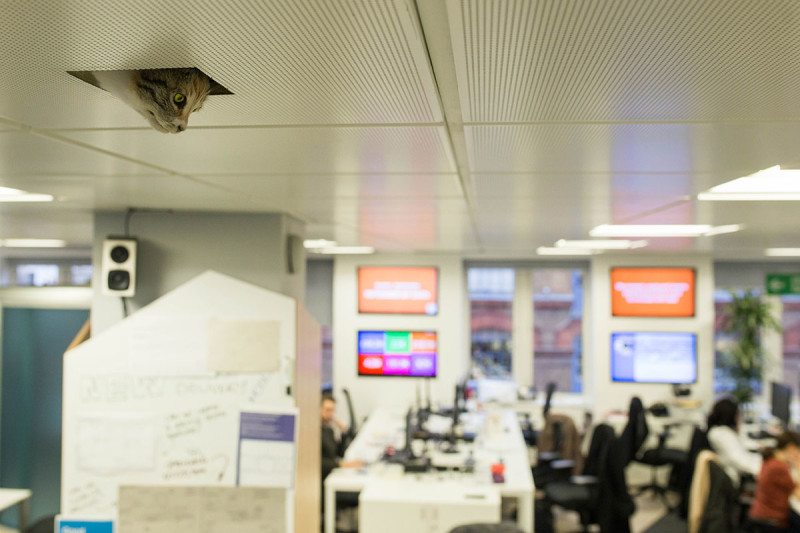
Visiting 😹 LMAO at London’s Open Data Institute for New Scientist, 2 February 2018
On Friday 12 January 2018, curators Julie Freeman and Hannah Redler Hawes left work at London’s Open Data Institute confident that, come Monday morning, there would be at least a few packets of crisps in the office.
Artist Ellie Harrison‘s Vending Machine (2009; pictured below) sits in the ODI’s kitchen, one of the more venerable exhibits to have been acquired over the institute’s five-year programme celebrating data as culture. It has been hacked to dispense a packet of salty snacks whenever the BBC’s RSS feed carries a news item containing financial misfortune.
No one could have guessed that, come 7 am on Monday morning, Carillion, the UK government’s giant services contractor, would have gone into liquidation. There were so many packets in the hopper, no one could open the door, say staff.
Such apparently silly anecdotes are the stuff of this year’s show, the fifth in the ODI’s annual exhibition series “Data as Culture”. This year, humour and absurdity are being harnessed to ask big questions about internet culture, privacy and artificial intelligence.
Looking at the world through algorithmic lenses may bring occasional insight, but what really matters here are the pratfalls as, time and again, our machines misconstrue a world they cannot possibly comprehend.
In 2017, artist Pip Thornton fed famous poems to Google’s online advertising service, Google AdWords, and printed the monetised results on till receipts. The framed results value the word “cloud” (as in I Wandered Lonely as a Cloud by William Wordsworth) highly, at £4.73, presumably because Google’s algorithm was dreaming of internet servers. It had no time at all for Wilfred Owen: “Froth-corrupted” (Dulce et Decorum Est) earned exactly £0.00.
You can, of course, reverse this game and ask what happens to people when they over-interpret machine-generated data, seeing patterns that aren’t there.
This is what Lee Montgomery has done with Stupidity Tax (2017). In an effort to understand his father’s mild but unaccountably secretive gambling habit, Montgomery has used a variety of data analysis techniques to attempt to predict the UK National Lottery. The sting in this particular tale is the installation’s associated website, which implies (mischievously, I hope) that the whole tongue-in-cheek effort has driven the artist ever so slightly mad.
Watching over the whole exhibition – literally because it’s peeking through a hole in a ceiling tile – is Franco and Eva Mattes’s Ceiling Cat, a taxidermied realisation of the internet meme, and a comment on the nature of surveillance beliefs (pictured top). “It’s cute and scary at the same time,” the artists say, “like the internet.”
Co-curator Freeman is a data artist herself. If you visited last year’s New Scientist Live you may well have seen her naked mole-rat surveillance project. The 7.5 million data points acquired by the project are now keeping network analysts busy at Queen Mary University of London. “We want to know if mole-rats make good encryption objects,” says Freeman. Their nest behaviours might generate true random numbers, handy for data security. “But the mole-rat queens are far too predictable… Crisp?”
Through a mouthful of salt and vinegar, I ask Freeman where her playfulness comes from. And as I suspected, there’s intellectual steel beneath: “Data is being constantly visualised so we can comprehend it,” she says, “and those visualisations are often done in a very short space of time, for a particular purpose, in a particular context, for a particular audience. Then they acquire this afterlife. All of a sudden, they’re the lenses we’re looking through. If you start thinking about data as something rigid and objective and bearing the weight of truth, then you’ve stopped discerning what is right and what is wrong.”
Freeman wants us to analyse data, not abandon it, and her exhibition is an act of tough love. “When we fetishise data, we end up with what’s happening in social media,” she says. “So many people drowning in metadata, pointing to pointers, and never acquiring any knowledge that’s deep and valuable. There should be some words to express that glut, that need to roll back a little bit. Here, have another crisp.”
